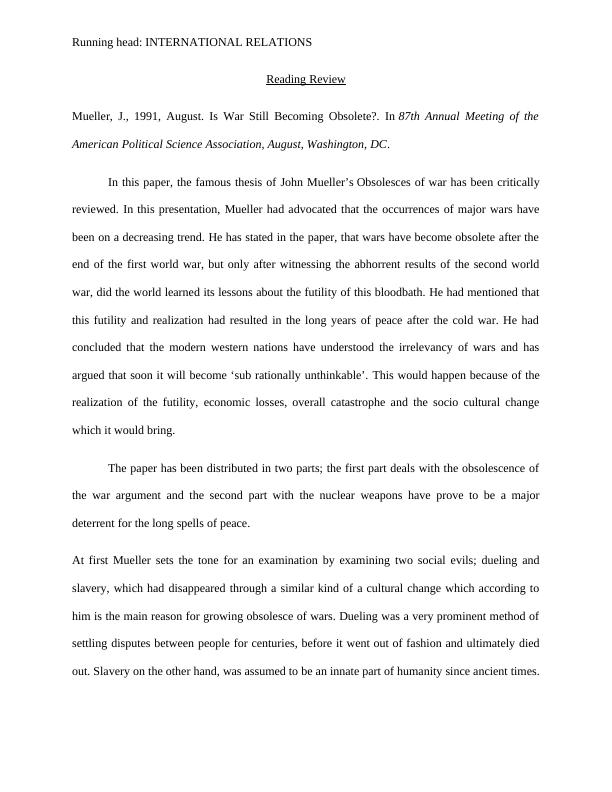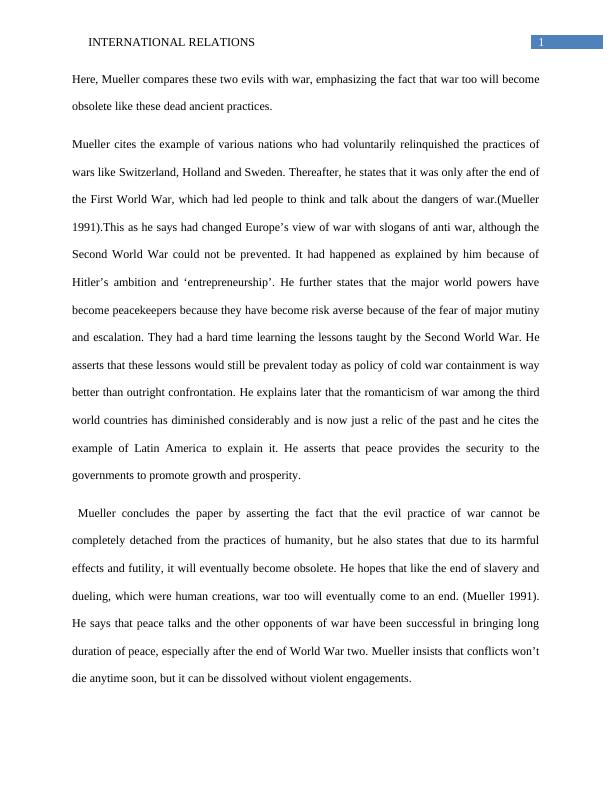Introduction to International relations assignment
Added on 2021-04-21
5 Pages1196 Words64 Views
Running head: INTERNATIONAL RELATIONSReading ReviewMueller, J., 1991, August. Is War Still Becoming Obsolete?. In87th Annual Meeting of theAmerican Political Science Association, August, Washington, DC.In this paper, the famous thesis of John Mueller’sObsolesces of war has been criticallyreviewed. In this presentation, Mueller had advocated that the occurrences of major wars havebeen on a decreasing trend. He has stated in the paper, that wars have become obsolete after theend of the first world war, but only after witnessing the abhorrent results of the second worldwar, did the world learned its lessons about the futility of this bloodbath. He had mentioned thatthis futility and realization had resulted in the long years of peace after the cold war. He hadconcluded that the modern western nations have understood the irrelevancy of wars and hasargued that soon it will become ‘sub rationally unthinkable’. This would happen because of therealization of the futility, economic losses, overall catastrophe and the socio cultural changewhich it would bring.The paper has been distributed in two parts; the first part deals with the obsolescence ofthe war argument and the second part with the nuclear weapons have prove to be a majordeterrent for the long spells of peace.At first Mueller sets the tone for an examination by examining two social evils; dueling andslavery, which had disappeared through a similar kind of a cultural change which according tohim is the main reason for growing obsolesce of wars. Dueling was a very prominent method ofsettling disputes between people for centuries, before it went out of fashion and ultimately diedout. Slavery on the other hand, was assumed to be an innate part of humanity since ancient times.

1INTERNATIONAL RELATIONSHere, Mueller compares these two evils with war, emphasizing the fact that war too will becomeobsolete like these dead ancient practices. Mueller cites the example of various nations who had voluntarily relinquished the practices ofwars like Switzerland, Holland and Sweden. Thereafter, he states that it was only after the end ofthe First World War, which had led people to think and talk about the dangers of war.(Mueller1991).This as he says had changed Europe’s view of war with slogans of anti war, although theSecond World War could not be prevented. It had happened as explained by him because ofHitler’s ambition and ‘entrepreneurship’. He further states that the major world powers havebecome peacekeepers because they have become risk averse because of the fear of major mutinyand escalation. They had a hard time learning the lessons taught by the Second World War. Heasserts that these lessons would still be prevalent today as policy of cold war containment is waybetter than outright confrontation. He explains later that the romanticism of war among the thirdworld countries has diminished considerably and is now just a relic of the past and he cites theexample of Latin America to explain it. He asserts that peace provides the security to thegovernments to promote growth and prosperity. Mueller concludes the paper by asserting the fact that the evil practice of war cannot becompletely detached from the practices of humanity, but he also states that due to its harmfuleffects and futility, it will eventually become obsolete. He hopes that like the end of slavery anddueling, which were human creations, war too will eventually come to an end. (Mueller 1991).He says that peace talks and the other opponents of war have been successful in bringing longduration of peace, especially after the end of World War two. Mueller insists that conflicts won’tdie anytime soon, but it can be dissolved without violent engagements.

End of preview
Want to access all the pages? Upload your documents or become a member.